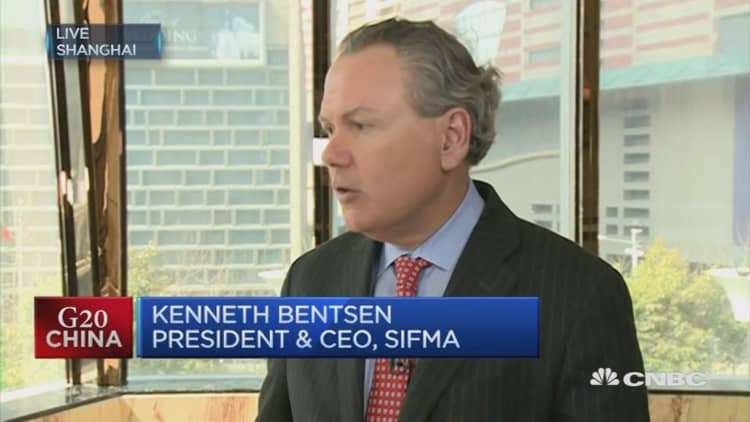


Amid ongoing volatility in Chinese and global markets, the People's Bank of China (PBOC) is urging investors to play a greater role in green financing, i.e. the funneling of private capital to fund environmental projects and clean technology.
Speaking to CNBC on Thursday, PBOC chief economist Ma Jun said the world's second-largest economy requires 2-4 trillion renminbi ($315-630 billion) in green investments to face national environmental challenges, which range from air and water pollution to land contamination.
But the government alone can't bear those costs, he warned.
"The public sector can only provide a maximum of 15 percent [of the 2-4 trillion renminbi] so the majority will have to come from the private sector....The financial system has to play a role in mobilizing private capital for green investment."
So, what form could that take?
According to Jun, the main channels will be through the banking system and a green bond market.
Chinese banks are already targeting environmental sectors in their lending practices—a move that's gaining momentum throughout Asia. Singaporean banks are expected to follow suit by 2017 while Indonesia announced plans last year to make green financing compulsory for banks by 2018.
At the end of last year, Beijing effectively launched its local currency green bond market by publishing a set of standards and guidelines, known as the Green Financial Bond Directive. The initiative was welcomed by many, with the World Resources Institute predicting it would translate into more low-carbon projects, including renewable energy and public transit systems, as a result.
But even as investors increasingly shun riskier assets, the PBOC believes demand for green debt will remain intact.
"Studies show green bonds perform equally or better than regular bonds in the [Chinese] market and this will be demonstrated in the future as well."
Green bonds currently make up less than 1 percent of the overall global fixed-income market, but Jun is expecting that to increase going forward.
"The potential for green bond investment in the framework of responsible investment is very big. The pace of global growth, for example, went from $3 billion issuance a few years ago to $42 billion last year. This year, we'll see even stronger growth."
Ultimately, he believes green investments can be a welcome pick-me-up for China.
"Demand growth for green is much stronger than overall economic growth. The growth potential in [green] areas could be 10-15 percent per year. Sufficient financing will help realize this potential growth and in turn, support the overall economy."


